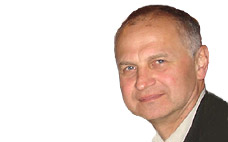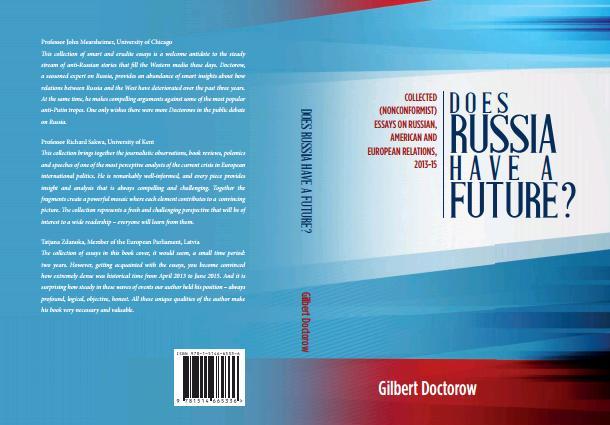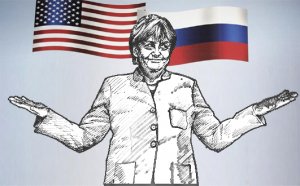
Vlad Sobell
Professor, Political Economy New York University Prague, teaches at universities in Prague and Berlin

DOES RUSSIA HAVE A FUTURE? Collected (Nonconformist) Essays on Russian, American and European Relations, 2013-15. Author: Gilbert Doctorow
This is Gilbert Doctorow’s second, follow-up collection of essays and commentaries on diverse Russia-related topics. (The first collection, Stepping Out of Line, appeared in late 2013.) Written in his trade-mark measured style, Doctorow’s book treats us to another feast of insights alongside polemics against high-profile academics and his own take on recent key issues and events. The essays are dated from between April 2013 and May 2015, a period that guarantees compelling reading: after all, it was this period that witnessed the events that led to the Ukrainian crisis, the February 2014 Washington-sponsored coup d’état in Kiev and the tragic consequences of that uprising.
As in his earlier work, the common thread of Doctorow’s analyses is alarm at the deteriorating quality of Russia-related scholarship in the US and the catastrophically low level of the policymaking discourse, whose grotesquely simplistic Neocon ideology is paralysing the Western mind. His message is that America’s academe, think tanks, media and policymakers have degenerated into Russia/Putin-hating zombies impervious to reason and hard evidence. In this toxic environment, lone voices of dissent – such as that of Professor Stephen Cohen or, to a lesser extent, John Mearshmeimer, who have dared to step out of line – risk being subjected to McCarthy-style ad hominem attacks or even worse. Those among us who have experienced Communist totalitarianism first-hand are obliged to warn that we are currently witnessing the rise of neo-totalitarianism.
Some of Doctorow’s commentaries, in particular his analyses of Putin’s speeches, implicitly contrast this intellectual desert with the demonstrable intelligence, pragmatism and, yes, superior political culture of the Russian President and his team. A truly independent thinker, Doctorow does not hesitate to identify Putin (the new Hitler in the eyes of the West) as the hero of our times "because he is the only figure on the world stage who stands up to American hegemony”.
Herein lies the source of Doctorow’s optimism about Russia, which has inspired the title of the book. Having thrown off the shackles of Marxian Communism (the poisonous fruit of the West European civilization), Russia can now confidently look ahead. Indeed, the Putin regime’s unequivocal assertion of sovereignty and its calm conduct in the face of Washington’s persistent provocations are telling proof that Russia does, indeed, have a future. This raises numerous weighty questions: Has Russia’s need to overcome its 20th century tribulations allowed it to evolve a government that is more intelligent and more effective than those in the ideology-debilitated West? Are West European elites, contemptuously treated by Washington as its vassals, subconsciously envious of Russia’s robust health and independence and the self-respect that comes with those attributes? Is this the real reason why the economically bankrupt and morally decadent West hates Russia so much? And finally, is it possible to hope that the campaign against the Russian Federation will be called off if and when the West recovers its capacity for rational thought? Reading Doctorow, it is difficult to answer this last question in the affirmative.
Some of the most alarming pieces in Doctorow’s compilation delve into European affairs, with an inevitably focus on Germany. The final essay, the author’s reflections on the April 2015 Schlangenbad Dialogue conference, recalls an environment in which irrational hatred of Russia prevailed rather than an informed and reasoned discourse among the assembled policy wonks. Doctorow writes:
Listening to my fellow participants during the plenary sessions…I was left in no doubt that the great majority of the Germans present fully believe in the new secular religion that also holds sway in the European Institutions in Brussels. I call it a religion because it is based on articles of faith. None of the postulates can be proven though they are accepted as ultimate truth by all believers.
The "articles of faith” to which Doctorow refers are the beliefs that since Russia is an authoritarian state – one that allegedly does not base its foreign policy on the universal values of democracy, protection of human rights and the rule of law – the West cannot do "business as usual” with it. And for that reason we will continue to impose sanctions and seek to isolate Russia even if we inflict huge economic and reputational damage on ourselves in the process.
This conclusion is disconcerting – for at least two reasons. First, it illustrates the extent to which America’s neo-totalitarian political culture has spread to the Old Continent, eviscerating its capacity of independent thought and conduct that could and would allow it to pursue its own vital interests. Second, it goes some way towards explaining why Germany seems to be eagerly assisting Washington in the destruction of Europe’s relationship with Russia, which, apart from posing immense security risks, threatens some 300,000 German jobs.
As Doctorow explains, Angela Merkel’s Berlin prefers to focus on post-Communist Central Europe as the source of relatively cheap but highly skilled labour that can supply components for German export-oriented Mittelstand and manufacturing giants, thereby supporting millions of higher value-added jobs in Germany itself. The whipped-up hysteria about a "revisionist Russia” comes in handy because it supplies the ideological glue for this new system of Central European satellites. That this narrow-minded, destructive strategy is utterly misconceived is neither here nor there. It is merely yet further proof that the West is no longer able to produce and implement constructive visions. The torch of Reason is now being brandished by none other than the formerly Communist superpowers – Russia and China.



_jpg/250px-ElbeDay1945_(NARA_ww2-121).jpg)









